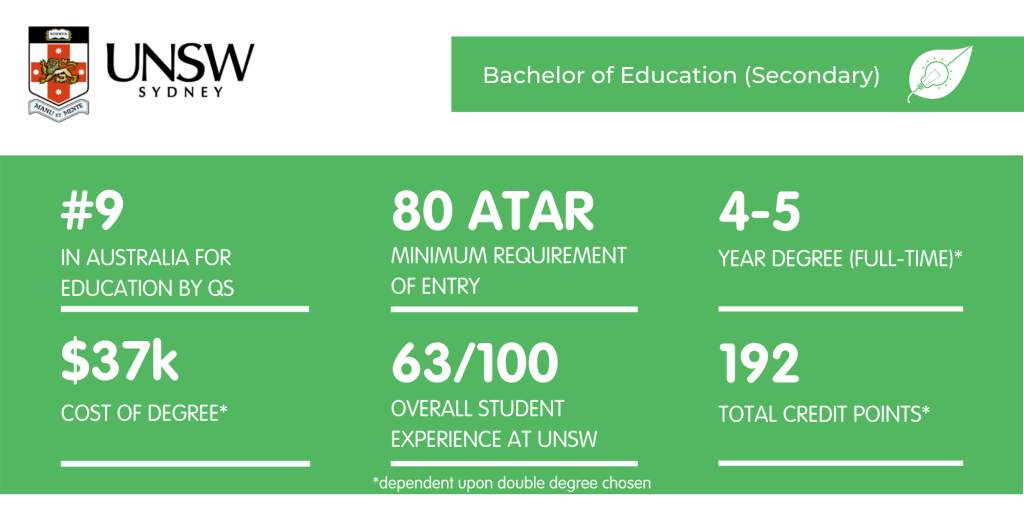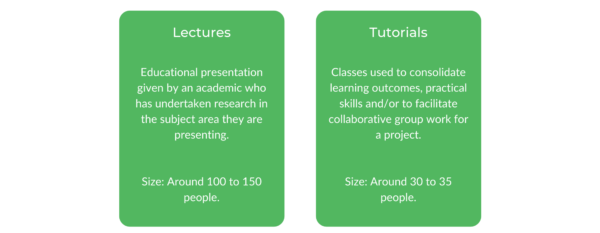Do you enjoy teaching others? Have you ever wanted to work at a high school? Then, studying a Bachelor of Education (Secondary) at UNSW could be the right degree for you!
In this article, you’ll get all the ins-and-outs of the course from core units, admission requirements to the faculty and culture.
Keep reading to know more!
What is a Bachelor of Education (Secondary) at UNSW?
Core Units for this Degree
How to Get into a Bachelor of Education at UNSW
What’s the Teaching Format?
What’s the Faculty and Culture Like?
What is a Bachelor of Education (Secondary) at UNSW?
A Bachelor of Education (Secondary) at UNSW is a course that qualifies students to work as teachers in secondary education all throughout Australia!
During the course, students explore how to teach content with the use of recommended learning and instruction methods, as well as how to lead the way in improving the education system. In addition, students are immersed into their future careers, working in secondary schools as teaching assistants in the first, second and fourth year of their course!
Can this degree be studied in conjunction with another?
A Bachelor of Education (Secondary) at UNSW must be studied as a double degree and depending on the second degree, the ATAR and length of degree can change. There are 8 options for your second degree:
Honours
While an Honours program is not mandatory to be accredited to work as a teacher, the Bachelor of Education (Secondary) (Honours) can also be an option for graduates who want to seek further tertiary education!
This program is an additional one year of study and is available for Bachelor of Education (Secondary) students with a WAM of 70 or higher. Honours students will deepen their knowledge in a specific area of education and complete a Thesis or Project.
Career Paths
For graduates, the most transferable career option is a teacher at an Australian secondary school.
As a mandatory double degree course, there are also other career options depending on the second degree. For example, Economics graduates can also enter into the workforce as a Policy development specialist or a managerial consultant.
Core Units for this Degree
There are 10 core units in a Bachelor of Education (Secondary) at UNSW.
-
- Educational Psychology
- Social Perspectives in Education
- Indigenous Perspectives in Education
- Professional Engagement
- Learning and Teaching: Language, Literacy and Numeracy
- Special Education: Inclusive Strategies
- Managing the Classroom Environment
- Professional Experience 1
- Responding to Gifted and Talented Students
- Professional Experience 2/Internship
In Educational Psychology, students are taught about the current recommended practices to facilitate learning and instruction. These are grounded by psychological concepts such as cognitive development and the development of memory.
On the other hand, Social Perspectives in Education prompts students to think critically about the education system and the way social, cultural, economic, and gender differences changes the effectiveness of current teaching methods.
Are there any majors?
There are no majors in a Bachelor of Education (Secondary) at UNSW but, depending on your second degree, you may have to choose a major.
If you decide to study a Bachelor of Fine Arts or Bachelor of Arts as your second degree, you will have to choose a major. For example, an Arts student has a variety of majors and minors to choose from.
Students will typically base their decisions on what they would like to teach as a secondary teacher e.g. History major with an English minor. Students studying a Bachelor of Fine Arts can choose either the Studio Practice or Art Theory major.
Are there work experience opportunities?
When it comes to a profession such as teaching, first-hand experience is an important step to prepare students for their future workplace.
The units Professional Engagement, Professional Experience 1 and Professional Experience 2/Internship provide students with 80 days of professional experience where they work as teaching assistants at secondary schools. These can often be the best and most rewarding part of your degree because of its hands-on nature!
How to Get into Bachelor of Education at UNSW
The ATAR cut-off for a Bachelor of Education (Secondary) at UNSW depends on your second degree. Most degrees have an ATAR cut-off of 80 while a Bachelor of Economics and a Bachelor of Commerce have an ATAR cut-off of 93 and 96 respectively.
Alternative Pathways
If your ATAR mark hasn’t met the cut-off, check with the UNSW HSC Plus program. Students can be awarded a maximum of 5 points if they have performed well on relevant HSC subjects! However, this program will not be available for applicants seeking to study a Bachelor of Commerce.
Students may also apply for a Year 11 or Year 12 early conditional offer if they are a part of the UNSW Gateway program. A Gateway school is recognised as a school with a disadvantaged geography or socio-economic status.
Assumed Knowledge
For all applicants studying a Bachelor of Education (Secondary) at UNSW, there is assumed knowledge which is a Band 5 or higher in any two units of HSC English.
For students with a second degree in a Bachelor of Commerce and Bachelor of Economics, Mathematics Advanced is assumed.
For Bachelor of Science students, Mathematics Advanced and Chemistry is assumed, as well as one of the following units: Biology or Earth and Environmental Science, Physics or Mathematics Extension 1. Bachelor of Music applicants will need to have reached either Grade 7 AMEB Performance and Music 2, or Grade 6 AMEB Musicianship, or Music Extension.
Scholarships
There might be some scholarships that you could receive while studying a Bachelor of Education (Secondary) at UNSW! The Faculty of Arts and Sciences Undergraduate Scholarships for High School Leavers offers $5000 per year for the recipient with demonstrated academic merit, leadership and extracurricular activities, and commitment to their area of study!
What’s the Teaching Format?
A Bachelor of Education (Secondary) at UNSW is taught in trimesters. With the exception of work placement units, the course is taught in a combination of lectures and tutorials.
Class Structure
Lectures
In lectures, students learn the theoretical foundations of teaching, such as recommended practices and approaches in school classrooms. While most of these classes are led by lecturers, there can be some student-to-student discussions.
Lectures are around 2 to 3 hours and have a large class size of 100 to 150 students.
Tutorials
Tutorials consolidate lecture content, where student discussion and group-work leads the class dynamic. This is a chance to ask the tutor about any questions, and even go further with the set readings and concepts!
Tutorials are around 1 to 2 hours and have a smaller class size of 30 to 35 students.
How much time do you spend on campus?
The contact hours for a Bachelor of Education (Secondary) at UNSW is around 12 hours a week, though this will vary with the choice of the second degree. For example, a Science student will have more contact hours than an Arts student.
What are the assessments like?
The majority of assessments for a Bachelor of Education (Secondary) at UNSW are written assessments, which includes papers and research essays.
The unit structure usually has two assessments, the first weighing about 40% and the final weighing around 60%. Though, there will be variations to this structure such as smaller exams and presentations.
In papers, students are typically given a hypothetical classroom situation in which they write their appropriate teaching approach (in-class tasks, communication practices) and justify their decisions through scholarly research.
In research essays, students analyse and review particular situations in real life such as current schools, their demographics or education methods. There is usually a component of reflection or personal opinion in these assessments.
The core aim of these assessments is to prepare the student, as a future teacher, to make quick and critical decisions once they are working in the classroom.
Skills That You Refine and Learn
Completing a Bachelor of Education (Secondary) at UNSW provides students with three core skills: leadership, communication and decision-making. These are all highly transferable skills to their future workplaces.
As a future teacher, students will learn how to lead the classroom in different scenarios e.g. gifted and talented students, co-ed situations. In order to teach the content, teachers must gain their class’ respect and trust through strong and inclusive leadership tactics. Through their work placements, they develop a keen eye for a healthy classroom dynamic.
For teachers, smooth communication is important for their students, colleagues and parents/carers. Apart from knowing how to teach the content, there are a range of situations that Education students must be prepared for. These include collaborating with other teachers, responding to parents’ concerns and even working with students who require more attention.
As classrooms can be quick-paced environments, future teachers build on their capacity to make decisions in an equally quick and rational way. For example, they might figure out that a more effective teaching practice would be to provide more challenging and independent learning, or the opposite.
What’s the Faculty and Culture Like?
Faculty
For incoming students, you will find that the UNSW Education faculty is a large and social community. Though students and staff are welcoming, the more you are willing to put yourself out there the more you will gain a deep and rewarding experience out of your university study.
Culture
UNSW has a strong society culture. No matter your interests, you’ll be able to find a group of like minded people!
For example, joining Food Lovers society and UNSW Revue Societies are a great way to gain more fun and social side of the university experience.
UNSW Education Society
As Education students, the UNSW Education Society is a definite society to join for professional development. The society has a strong focus on networking and professional learning which are presented in casual settings.
For example, there are assessment workshops, accreditation workshops and ‘conversation cafés’ where students teach English to people who have English as their second language.
Revue
Revue is great for people who haven’t done anything performance-related and want to try something creative such as singing and comedic acting. The structure of Revue events is especially great for building new friendships because you’re all going through a shared experience!
Interested in the pros and cons of a Secondary Education degree at UNSW? Check out our article here!
Lynn Chen is a Content Writer at Art of Smart Education and is a Communication student at UTS with a major in Creative Writing. Lynn’s articles have been published in Vertigo, The Comma, and Shut Up and Go. In her spare time, she also writes poetry.






